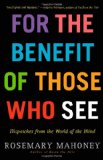Summary | Excerpt | Reviews | Beyond the Book | Readalikes | Genres & Themes | Author Bio

Dispatches from the World of the Blind
by Rosemary Mahoney
Presently a sort of screen slid across the eyeball, like a paper-thin sheet of ice, and then it crumpled and the eye was bathed in a foam of crystalline bubbles that slowly dissolved. Next, a metal clamp appeared, dug deep beneath the edges of the upper and lower lids, and pried them wide apart. And then a spade-shaped scalpel blade moved into view, hovering half an inch above the glittering eyeball. At the sight of this razor so close to the eye, I felt my face clench into a grimace, and my right hand leaped involuntarily to my throat in a nonsensical gesture of self-defense. I had made a mistake in choosing to watch, but having agreed to do it, I could not look away now—it was a matter of both stubborn pride and obsessive curiosity. The tip of the scalpel pierced the cornea at the edge of the iris and began to carve its way around the brilliant blue circumference.
I am not a squeamish person, but at the sight of this piercing it was all I could do to keep myself from shrieking and running out of the room. (The cornea, the transparent film that protects the iris and the pupil, is by the way one of the most sensitive tissues of the human body, packed with so many hotly vibrating nerves that the slightest intrusion produces an explosion of excruciating pain. If you haven't gleaned this fact from your own life's experience, you are an unusual person indeed.) With a small hook, the surgeon lifted the clear circular flap of cornea that he had, but for a small connective strand of tissue, cut free from the eyeball, and flipped it up, like the nearly severed lid of a tin can. The black pupil at the center of all this activity continued to stare straight ahead, spookily, not moving a fraction of an inch left or right, as if mesmerized by visions of an apocalyptic future.
I looked away from the screen and through the window into the operating room. The surgeon's back was to me. Dressed in a sky-blue robe and puffy blue shower cap, he was hunched over his microscope, his two small eyes pressed to its eyepieces, while a big-hipped nurse stood slightly behind him in the posture of a lobster—elbows crooked and lifted slightly away from her body, gloved hands raised near her ears, and a swab of cotton pincered between the thumb and forefinger of each hand. Several inches beneath the bottom lens of the microscope, Aias's face was bathed in a pool of intense orange light. The surgeon's gloved hands basked and darted in the pool like fish in a tank. More disturbing things happened in this surgery: drops of liquid were flung rudely into the eye, cotton swabs were raked across the eyeball, an intensely bright and vibrating laser strobe light circled around and around the dilated pupil, and all of this in a manner that seemed blunt and savage. It was like watching a seal pup being torn to shreds by a ravening shark.
At some point I realized that in my distress, my left hand had joined my right hand at my throat to assist in the self-defense, as if perhaps I was expecting the scalpel to jump out of the screen and take a stab at me. I watched the surgery but tried not to perceive it, saw the violated eye but tried not to comprehend it, yet it was impossible to remain calm while viewing this lurid physical anathema.
The surgical hook appeared again and fitted the slick layer of cornea back over the iris with a jaunty little flip of dismissal: Ho-hum, that one's done. Next, please.
I stared, fixated. What would keep the almost severed cornea in place now? What would prevent it from falling out and dangling on Aias's eyelash when he stood up?
From the corner of my eye I saw a rapid blur of motion near the window. It was the surgeon; he had turned toward me and was waving his scalpel in friendly greeting. Having caught my attention, he gave me a wink above his surgical mask and added to it a jocular little hulaesque swing of his hips and the double thumbs-up sign to show that all had gone well with the first eye.
Excerpted from For the Benefit of Those Who See by Rosemary Mahoney. Copyright © 2014 by Rosemary Mahoney. Excerpted by permission of Little Brown & Company. All rights reserved. No part of this excerpt may be reproduced or reprinted without permission in writing from the publisher.
Your guide toexceptional books
BookBrowse seeks out and recommends the best in contemporary fiction and nonfiction—books that not only engage and entertain but also deepen our understanding of ourselves and the world around us.